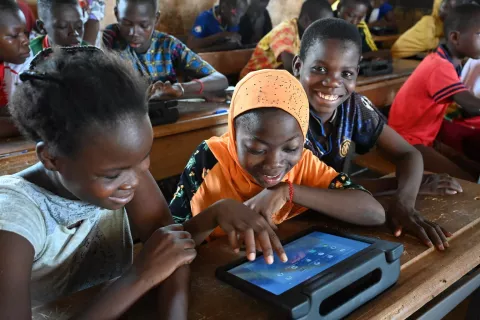Our experience: Helping frugal innovations flourish
How UNICEF contributes to the frugal innovation ecosystem

Frugal innovations are generally described as products or services that are often born out of necessity and lack of resources, built by the people who need them the most with locally sourced materials. Because of their characteristics, frugal innovations call for a radically new approach in the involvement of local communities.
To support the creation, adoption and scalability of frugal innovations, UNICEF has been leveraging its role as a major enabler in this field at various points in the frugal innovation lifecycle and ecosystem.
Strengthening environment and skills sets needed for frugal innovations to flourish
As frugal innovations are extremely context sensitive and local people are the ones best placed to understand their needs and address them, UNICEF partners with communities to strengthen their capacity to devise solutions to the challenges they experience first-hand.
UNICEF’s UPSHIFT program is designed to build transferable skills and create opportunity, with a focus on the most disadvantaged young people. Through a combination of outreach and inspiration, human-centred design workshops, mentorship and coaching and, in some cases seed funding, participants gain valuable transferable skills, including problem solving, critical thinking, creativity, collaboration and leadership.
This approach has shown strong impact already. In Kosovo, young people concerned about air quality have developed panels with local moss and weeds that can absorb air pollution. Groups of hard-of-hearing youth created and installed the Interactive Alphabet in Ukraine, an alphabet composed of a set of wooden cubes where each letter is illustrated, represented by their sign language equivalent and word.
UNICEF is also facilitating the development of frugal innovations addressing the current COVID pandemic through a variety of actions, including partnering with UNDP in a COVID Innovation Challenge and compiling a Frugal Products for COVID landscape catalogue for inspiration and awareness.

Brokering and bringing unique blends of expertise, partners and approaches to validate frugal innovations
Having direct experience with the frugal innovation lifecycle and understanding its specific challenges, UNICEF creates value by bringing together a unique set of talents, conditions and resources to exponentially move identified areas of impact forward.
In the case of the Designing 21st Century Ger initiative, UNICEF's Office of Innovation, UNICEF Mongolia and local partner GerHub, worked together to bring about improvements to the “ger”, the traditional Mongolian home.
The use of these tent-like homes goes back more than 2,500 years, and they have endured through a process of constant innovation by their owners, who rebuild them on a regular basis. Mongolians are highly skilled in trying out different iterations, but lacked the opportunity to validate how effective these changes were in improving the insulation and thus reducing their contribution to air pollution.
Ulaanbaatar – home to half of Mongolia’s three million population – has the most toxic air in the world during winter, with the biggest source of air pollution coming from coal-burning stoves in the ‘ger district’ of the capital city. This condition affects children the most.
UNICEF saw the opportunity to contribute by building out unique and missing expertise in this ecosystem. We convened local and international experts from the fields of architecture, design, education, material science, urban planning, building science, and international development to exchange knowledge and ideas for design improvements that could upgrade ger performance in winter.
The outcome of the work of this multi-disciplinary, multi-stakeholder group resulted in gathering the most complete data set and models on the thermal efficiency of gers, the creation of open-source, improved ger designs with sustainability, affordability and local production in mind, as well evidence that informed shifts in local government policies.
Spreading the word to amplify the impact of frugal innovations
UNICEF has been playing an instrumental role in facilitating frugal innovations among multiple contexts and geographies, with its communications expertise becoming an important lever of change even beyond its regular programming.
Frugal WASH innovations like the simple, DIY tippy tap, have helped communities in Sudan without access to clean water and sanitation help themselves. They are proving their value against surging COVID-19 cases, such as in South Africa, where youth are making Tippy Taps in areas where there is limited access to running water and soap for handwashing. Tippy Taps are simple, hands-free hand washing devices that prevent viruses or bacteria from spreading from one user to the next, made with low-cost salvaged materials and only using 40 ml of water and reduces water wastage.
For example, in Tanzania UNICEF has been spearheading the Kangaroo Mother Care initiative to address the lack of incubators for preterm babies in rural areas. KMC uses skin-to-skin contact to help preterm babies by wrapping them with a cloth close to their mother’s skin, mimicking a Kangaroo pouch. This method has many benefits, and has been proven to significantly raise survival rates (data show that reaching all preterm babies in Tanzania with KMC alone would save the lives of at least 5,000 newborns every year).
We have learned that our most effective contributions to the frugal innovation ecosystem lie in brokering and bringing unique blends of expertise, partners and approaches to validate frugal innovations, amplifying awareness of effective frugal innovations and how to adopt them so many more people can do so, and strengthening the environment and the skills sets needed for frugal innovations to flourish. As youth and communities take on an ever-active role in improving their context through frugal innovations, UNICEF will continue to support them in the design, implementation and growth of their own ideas for change.




